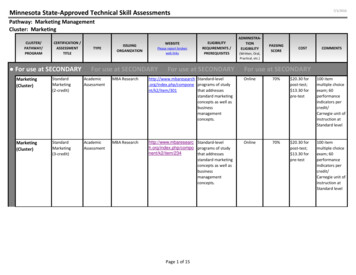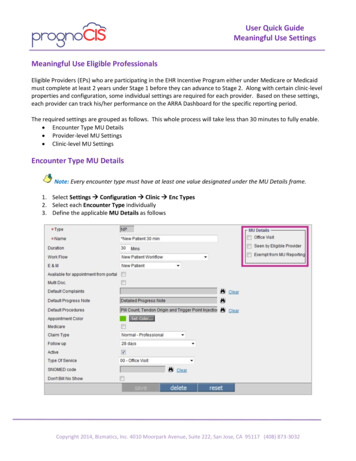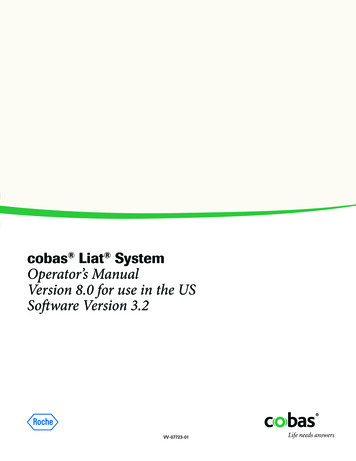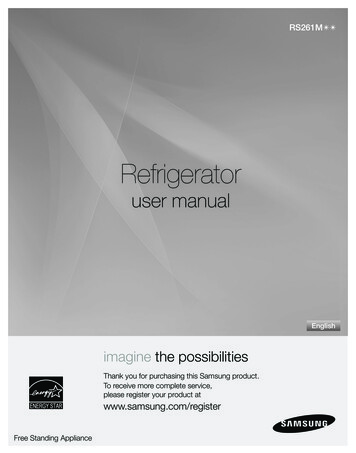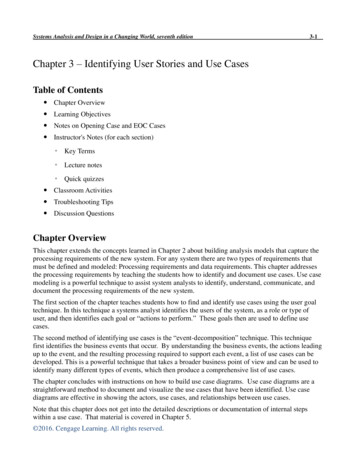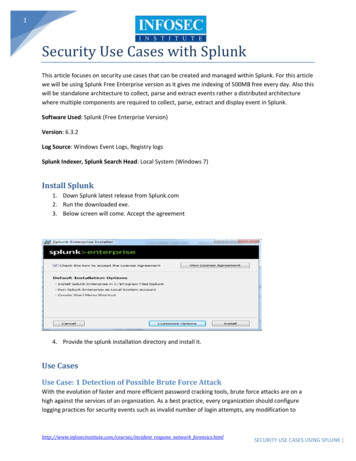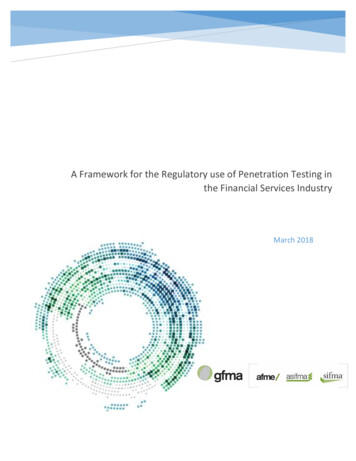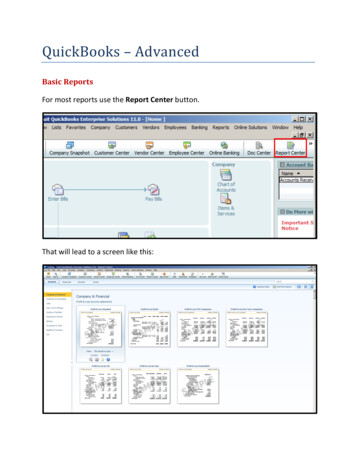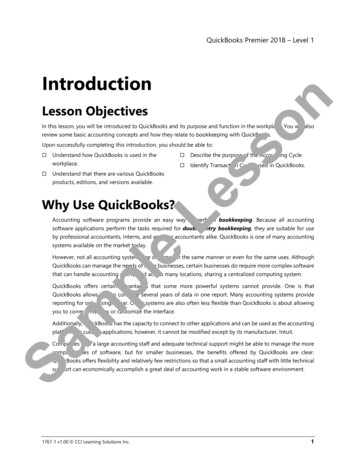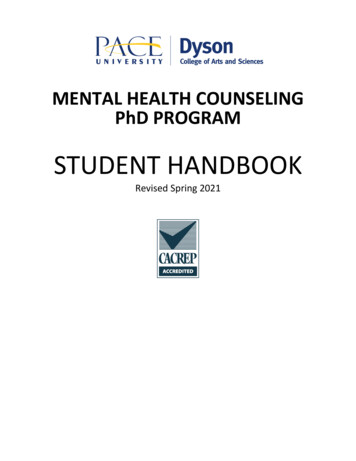
Transcription
MENTAL HEALTH COUNSELINGPhD PROGRAMSTUDENT HANDBOOKRevised Spring 2021
Table of ContentsI.MISSION STATEMENTA. Handbook Mission StatementB. Program Mission StatementC. Program Objectives3333II.UNIVERSITY AND PROGRAM INFORMATIONA. Admissions RequirementsB. Academic AdvisingC. Important Contact InformationD. Doctoral AssistantshipsE. Liability Insurance555666III. DOCTORAL PROGRAM SEQUENCEA. CurriculumB. Course DescriptionsC. Pre-Candidacy: Coursework and the Comprehensive ExaminationD. CandidacyE. Student Progress Evaluation1. Academic Probation Policy2. Dismissal Policy3. Remediation Process4. Appeal of Academic Dismissal Policy77811121213141516IV. DOCTORAL DISSERTATIONA. OverviewB. Dissertation SequenceC. Doctoral CommitteeD. Dissertation ProposalE. Data Collection and AnalysisF. Dissertation Defense18181819202121V.2223262728APPENDICESA. Dissertation Mentor and Advisee Agreement FormB. Dissertation Proposal Approval FormC. Dissertation Approval FormD. Faculty Biographies2020/20212
I. Mission StatementA. Handbook Mission StatementThis student handbook introduces the philosophy underlying doctoral study in mental healthcounseling at Pace University, describes the stages of progression through the doctoral program,states applicable policies and procedures, provides advice, and includes copies of relevant formsfor the program. The stated policies and procedures apply to all students, but are subject to changeat the University’s and/or program’s discretion. This handbook is provided to students andapplicants for their general guidance only.All students are expected to read this handbook and have a thorough understanding of its contents.Students should also be aware that they can discuss the handbook and direct questions andconcerns to their faculty advisor or program chair. Students should understand that this handbookmay be modified as University or program policies, procedures and guidelines are implemented orchanged. It is the student’s responsibility to review the handbook periodically in order to remaincurrent with its contents.B. Our PhD Program’s Mission StatementThe primary objective of the PhD in Mental Health Counseling program is to trainmental health counselors in advanced clinical and supervisory skills, prepare themto conduct research that will further the profession’s knowledge base, and fosterthe next generation of leaders who will be teachers and advocates for the mentalhealth counseling profession across the country.It is the goal of the doctoral program to prepare mental health counseling professionals who: (a)demonstrate the ability to teach counseling students, (b) are effective clinicians that can recognizeand address mental health needs, (c) are prepared to conduct research and make significantcontributions to the field (d) are active advocates who can assist both individuals and communitiesin overcoming barriers, and (e) are effective supervisors for counselors-in-training.C. Program ObjectivesThe doctoral program in Mental Health Counseling is developed to prepare professionals in fiveareas: counselor education, supervision, advocacy, research and advanced counseling practice. Theobjectives of this program have been developed specific to these areas. By completion of theprogram, doctoral students will:1. Demonstrate skills and knowledge in regards to the roles and responsibilities related toeducating counselors. This includes the advancement of skills related to current teachingmethods, curriculum development, and the delivery and evaluation of course objectives.2020/20213
2. Demonstrate skills and knowledge related to supervision, including theoretical frameworkand models, supervisee assessment, remediation, and gatekeeping functions.3. Design and conduct scholarly research that contributes new and interesting information tothe counseling profession. This includes training in the formulation of questions asresearchable hypotheses, formation of research designs, and the creation of publishablework.4. Demonstrate leadership and advocacy in various counseling organizations andconferences, as well as providing leadership regarding social justice issues.5. Demonstrate knowledge and skills in regards to clinical practice. This includes anunderstanding of theories relevant to counseling, the integration of various methods andmodalities, and demonstration of ethical and cultural competence.Meeting Objectives:Students will be able to explain various perspectives, exchange ideas, and utilize the principles,concepts, skills, and applications of advanced counseling, counselor education, researchmethodology, counselor supervision and advocacy. This will be accomplished through facultymentoring, coursework, practicum, and internship, and independent and dissertation research.These objectives will be met by familiarizing and exposing students to:1. The principles and practices of counseling2. Theories and practices of supervision3. Instructional theory and methods relevant to counselor education,4. Social and cultural issues, including social change theory and advocacy action planning,5. Design and implementation of quantitative research and methodology6. Models and methods of assessment and use of data7. Ethical and legal considerations in counselor education and supervision8. Leadership roles in the field of counseling as college and university faculty, advancedpractitioners, consultants, researchers and scholarly authors, and administrators9. Multicultural awareness that will result in culturally appropriate practices in all areas ofcounseling, education and supervision2020/20214
II. University and Program InformationA. Admission RequirementsThis program is designed to train mental health counselors in advanced clinical and supervisoryskills, prepare counselors to conduct research that will further the profession’s knowledge base,and foster the next generation of leaders who will be teachers and advocates for the mental healthcounseling profession across the country.Application requirements include: An earned Master’s degree in mental health counseling with a curriculum equivalent tothat of Pace University’s 60-credit graduate Master of Science program in Mental HealthCounseling. Earned Graduate-level GPA of 3.6 or higher. Met one of the following permit/licensure requirements:1. Be eligible for New York State limited permit in mental health counseling in New YorkState.2. Has obtained a limited permit in New York State.3. Be licensed in mental health counseling in New York State.4. Be licensed in mental health counseling in a state other than New York. Submitted letters of recommendation, personal statement, official academic transcripts,and GRE scores taken within the previous five years. Interview with faculty members.To begin the application process you may either apply online or download our application forgraduate admission. More information can be found on the program’s tal-health-counseling-plvB. Academic AdvisingUpon acceptance into the PhD in Mental Health Counseling program, students receive academicadvising from Vanessa Ramkissoon (vramkissoon@pace.edu). The academic advisor isresponsible for maintaining student records, as well as registering doctoral students for courses.The advisor coordinates the class schedule for each semester and can answer questions regardingscheduling. The advisor can be reached at 914-773-3791.2020/20215
C. Important Contact InformationProgram Director: Dr. Rostyslaw RobakAcademic Advisor: Vanessa RamkissoonGraduate AdmissionsOffice of Student Assistance Financial Aid Student Accounts and Registration Degree AuditMortola LibrarySecurityITS HelpdeskBookstore(914) 773-3791vramkissoon@pace.edu(914) 422-4283GradWP@pace.edu1-(877) 672-1830(914) 773-3505(914) 773-3700(914) 773-3333(914) 773-3761Center for Academic ExcellenceCenter for Community Action and ResearchCooperative Education and Career ServicesCounseling ServicesDean for StudentsHealth Services(914) 773-3434(914) 773-3539(914) 773-3415(914) 773-3710(914) 773-3351(914) 773-3760Office for Student SuccessStudent Development and Campus ActivitiesStudy AbroadTesting and Disability Accommodations(212) 346-1915(914) 773-3767(914) 773-3399(914) 773-3710D. Doctoral AssistantshipsEach year, provided funding is available, all students are considered for graduate assistantships.Other students may be eligible for adjunct teaching positions within the department, at either theundergraduate or graduate level, on an as needed basis determined by the department.E. Liability InsuranceAll students are required to obtain professional liability insurance when providing counselingservices; this coverage would include semesters in which students are completing MHC710Practicum and MHC 725 Internship Seminar. Although lawsuits involving counseling students areuncommon, students providing any services to the public are vulnerable to the threat of a lawsuit.Liability insurance is available to NYMHCA and ACA Members.2020/20216
III. Doctoral Program SequenceA. CurriculumPace University’s Mental Health counseling PhD is a full-time, 48-credit program. A maximumstudy period of 8 years is allowed prior to the time the degree is awarded. The time limit beginsonce students have started their first semester. Students enrolled in this program take courses in ayearly sequence that span across two fall semesters, two spring semesters, and one summersemester. The first two years of the program consist of core coursework that includes practicum,internship and the passing of the comprehensive examination at the end of the first year. Full timeparticipation in this program is required for two years of doctoral course work.Year 1Summer (0 credits)MHC 700 Foundational Concepts of Research Design and Statistics (0 credits)Fall (12 credits)MHC 705 Statistics and Research Design I (4 credits)MHC 707 Qualitative Methods in Counseling Research (4 credits)MHC 731 Theories and Methods of Counselor Education (4 credits)Spring (12 Credits)MHC 706 Statistics and Research Design II (4 credits)MHC 830 Research Design: Special Topics: Seminar (4 credits)MHC 732 Theories and Methods of Counselor Supervision (4 credits)Doctoral Comprehensive ExamAt the end of this semester all students will be required to pass a comprehensive writtenexamination in order to enter into the second year of the program.Year 2Summer (0 credits)MHC 710 Doctoral Practicum in MHC (0 credits)Fall (12 Credits)MHC 733 Leadership and Advocacy in the Counseling Profession (4 credits)MHC 831 Doctoral Dissertation Seminar I (4 credits)MHC 725 Doctoral Internship I (4 credits)2020/20217
Spring (12 Credits)MHC 742 Advanced Theory and Practice of Counseling (4 credits)MHC 832 Doctoral Dissertation Seminar II (4 credits)MHC Elective Course (4 credits)MHC 726 Doctoral Internship II (0 credits)Dissertation SequenceUpon the successful completion of all courses, students will then be PhD candidates eligible toformally pursue their dissertation projects. This process will be composed of two formal steps: (1)Dissertation Proposal, and (2) Dissertation Defense.B. Course DescriptionsMHC 700 – Foundational Concepts of Research Design and StatisticsThis course is required of students who have not completed a graduate-level statistics course withinthe last 3 years. It serves as a preparation for MHC 705 Statistics and Research Design I.MHC 705 – Statistics and Research Design IThis course will serve as an introduction to statistics used in psychology. The course focuses on:descriptive statistics, basic inferential statistics, and nonparametric statistics. The overall goal ofthis course is to present the basic statistical techniques students need for simple analyses ofpsychological data. A second goal is to attain the skill of thinking statistically that will enablestudents to learn and understand analytic techniques with the aid of SPSS.MHC 706 – Statistics and Research Design IIThis course is a continuation of the introduction to statistics used in psychology that began in MHC705. It will focus on nonparametric statistics, correlation, regression, discriminant analysis, andfactor analysis. The overall goal of this course is to present the basic statistical techniques youmight need for intermediate to advanced analyses of psychological data. A second goal is to attainthe skill of thinking statistically that will enable students to learn and understand analytictechniques with the aid of SPSS.MHC 707 – Qualitative Methods in Counseling ResearchThe purpose of this course is to introduce students to the theories and practices of qualitativeresearch. Qualitative researchers focus on constructing and developing in-depth descriptions ofphenomena by spending time in the field and eliciting the meanings individuals give to differentexperiences. By the end of this course students will develop the skills to both critically readqualitative studies in counseling and conduct their own research studies.2020/20218
MHC 710 – PracticumThe purpose of this course is to further advance the skills and professional development ofdoctoral-level mental health counseling practitioners. Students will provide counseling in aprofessional setting. Via supervision, individual and group reflection, and counseling-skillsexercises, students will demonstrate proficiency in a number of core areas related to mental-healthcare delivery with diverse client populations.MHC 720 – Issues in Advanced Psychopathology and Its TreatmentStudents will gain an advanced understanding of the critical mental health issues impactingchildren, adolescents and adults. The course will focus on etiology, diagnosis treatment andevidence-based research. Cultural factors, gender, socioeconomic status, education, family, race,ethnicity and genetic predisposition to mental illness will be explored. Focus will includeprevention, community barriers and various forms of client treatment that will impact recovery.MHC 725 – Doctoral Internship ICounseling Internship provides students with opportunities to continue to develop as counselorsand leaders in the field. The internship provides students with opportunities to gain additionalexperience and knowledge in at least three of the five core areas: Counseling Teaching Supervision Research and scholarship Leadership and advocacyStudents will be engaged in the core activities listed above in professional categories and willreceive instruction and supervision in class as well as supervision in the field.MHC 726 – Doctoral Internship IICounseling Internship provides students with opportunities to continue to develop as counselorsand leaders in the field. The internship provides students with opportunities to gain additionalexperience and knowledge in at least three of the five core areas: Counseling Teaching Supervision Research and scholarship Leadership and advocacyStudents will be engaged in the core activities listed above in professional categories and willreceive instruction and supervision in class as well as supervision in the field.2020/20219
MHC 731 – Theories and Methods of Counselor EducationThe course provides an introduction to the profession of mental health counseling and counseloreducation. Specific topics addressed include: (1) history and organization of the profession, (2)program accreditation standards and practices, (3) instructional theory and methods relevant tocounselor education, and (4) ethical and legal considerations in counselor education.MHC 732 – Theories and Methods of Counselor SupervisionThis course examines models of counseling supervision. Critical analysis of theories of counselorsupervision, techniques associated with theories, and assessment of supervision models isemphasized. Practical experience for counseling professionals who have responsibility directingpersonal and professional development of counselors, promoting counseling competency, anddeveloping and implementing counseling services. This course is conducted as a seminar andincludes (a) input from other “supervisors” and the instructor, as well as (b) discussion based onassigned readings and (c) in-vivo role play (d) video recordings.MHC 733 – Leadership and Advocacy in the Counseling ProfessionThis course will provide experiences that allow students to (1) assess and (2) develop their personalleadership. Students will examine the values, knowledge, and skills required for effectiveadvocacy, consultation and collaboration. Emphasis is placed on the development of skills inplanning, coordinating and delivering programs that generate systemic change. Students will learnto use data to identify needs, overcome obstacles, and mobilize resources in communities andagencies in order to increase options for clients.MHC 742 – Advanced Theory and Practice of CounselingThis course is designed for advanced-level professional to gain a deeper understanding of themajor theories and approaches within the counseling profession, particularly those theories notcovered in traditional counseling course. Moreover, it is designed for counselor educators tobecome better informed about how to teach such material to master-level professionals in training.MHC 830 – Research Design: Special Topics SeminarThis course is part of a three-course sequence designed to prepare students to complete thedissertation requirement for the PhD in mental health counseling programs. Topics that areaddressed in this course include the application of the following in counselor research: (1) multipleregression, (2) confirmatory factor analysis, (3) cluster analysis, (4) single subject designs.MHC 831 – Doctoral Dissertation Seminar IA primary obligation of doctoral students is extending the knowledge base of the counselingprofession through scholarly inquiry. The Doctoral Dissertation Seminar serves as a preparationfor students to generate a project that will bring new knowledge for the counseling profession. Theresearch project proposal will begin a process that culminates in a dissertation that is appropriateto the field of mental health counseling practice, counselor education, or supervision. Students will2020/202110
demonstrate their work through scholarly writing that is shared in the seminar for constructivecriticism. A dissertation committee shall be constituted prior to the completion of this course.MHC 832 – Doctoral Dissertation Seminar IIThis course extends the project begun by each doctoral student in the Doctoral DissertationSeminar (MHC 831). Doctoral-level students engage in the professional task of extending theknowledge base of the counseling profession through scholarly inquiry. The Doctoral Colloquiumis the forum for the continuation and completion of the dissertation research appropriate to mentalhealth counseling practice, counselor education, or supervision.C. Pre-candidacyPre-candidacy is the period of time from formal admission and initial enrollment in the doctoralprogram through the successful completion of the comprehensive examination and all coursework.Critical components of the pre-candidacy period include program planning, completion ofcoursework, and the comprehensive examination. Once students successfully complete the firstyear of coursework, they are required to sit for the comprehensive examination. After successfullycompleting the comprehensive examination, students may begin their second year of coursework.Once students have completed 2 years of coursework, the pre-candidacy period ends.Comprehensive ExaminationAfter completing the first year of coursework, students are required to sit for the comprehensiveexamination, which consists of five general components: statistics, quantitative researchmethodology, qualitative research methodology, counselor education, and supervision. Studentsare required to demonstrate their ability to analyze and synthesize information from each of theirdoctoral courses, apply this information to assess issues in the fie
Pace University’s Mental Health counseling PhD is a full-time, 48-credit program. A maximum study period of 8years is allowed prior to the time the degree is awarded. The time limit begins once students have started their first seme
